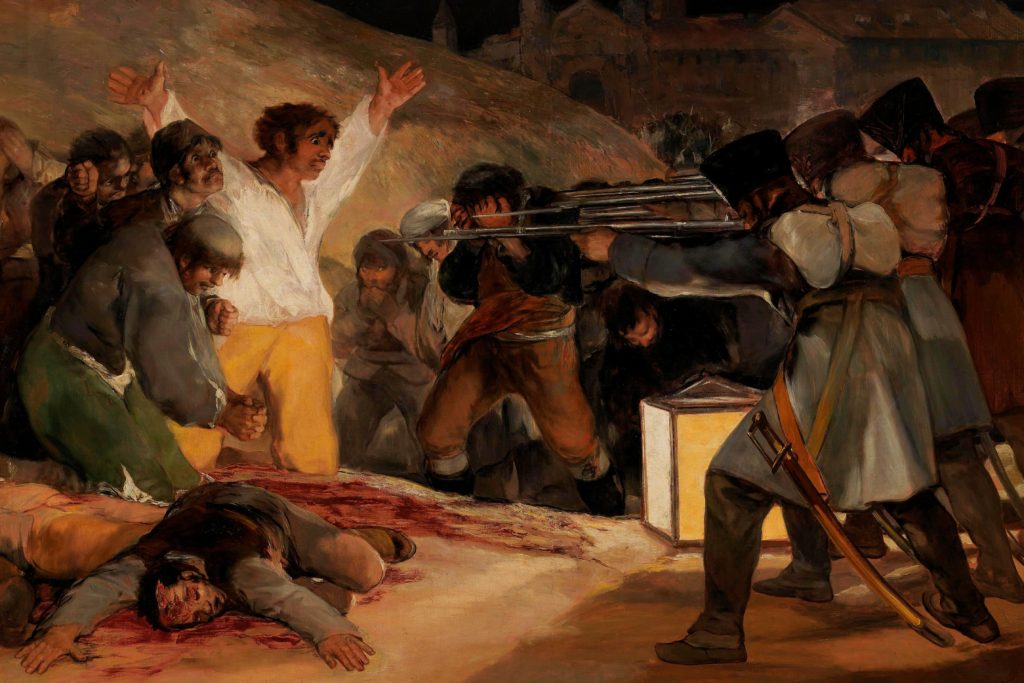Tuesday
We are once again seeing a rise in American gun deaths, accentuating once again the insanity of our gun laws (or lack of them). The last time we had meaningful bipartisan regulation was in 1967 and the reason for that says a lot about our country. The bill that then California Governor Ronald Reagan signed targeted the Black Panthers, who were carrying guns as they engaged in “copwatching.” When Whites open carry, by contrast, the GOP cites the Second Amendment.
The situation is admirably captured in Bertolt Brecht’s play The Exception and the Rule.
Before explaining how, let’s take a quick look at recent statistics. According to Gun Violence Archive, in 2021 there have so far been 24,305 gun-related deaths, 13,200 of them suicides. There have also been 370 mass shootings and 16 mass murders. In all, 171 children have died and 674 teens. For the rest of the grisly statistics, check out the website.
These figures don’t capture the racial dimensions of the issue, especially the fact that the “stand your ground” laws only apply to Whites standing their ground; that police are far more likely to use deadly force against Blacks than against Whites; that Whites can walk with impunity carrying automatic rifles whereas people call the police on Blacks just for making them uncomfortable; that only Muslims and people of color are labeled terrorists, not White Americans; and so on. One of the clearest expressions of the double standard has come from rightwing Sen. Ron Johnson of Wisconsin in remarks about the Capitol insurrection:
“Even though those thousands of people that were marching to the Capitol were trying to pressure people like me to vote the way they wanted me to vote, I knew those were people that love this country, that truly respect law enforcement, would never do anything to break the law, and so I wasn’t concerned,” Johnson said during the radio talk show The Joe Pags Show. He was discussing his recent comments downplaying the danger that day and he has said he “never really felt threatened.”
“Now, had the tables been turned — Joe, this could get me in trouble — had the tables been turned, and President Trump won the election and those were tens of thousands of Black Lives Matter and Antifa protesters, I might have been a little concerned,” Johnson continued.
Brecht’s work explains the double standard.
Like many of Brecht’s plays, Exception and the Rule is a parable about class relations. A merchant who must cross a desert in order to make a fortune kills his porter after mistaking a helpful gesture as a hostile move. Although the porter has offered him some of their dwindling water supplies, he thinks that man is attacking him and shoots him. Despite this, the judge in the subsequent trial exonerates him, ruling, “In the circumstances as established it was inevitable that he should believe himself threatened.”
We can see the verdict coming when the judge is questioning the merchant. Similar reasoning led a jury to free the killer of Trayvon Martin, the young teenager on his way back from a store:
What you mean is that you were right to believe that the porter must hold something against you. So you did indeed kill someone who might well be harmless, but only because you could not have known that he was harmless. It happens sometimes with our police. They shoot into a demonstrating crowd, a harmless crowd, but they shoot because they can only believe that these people are going to drag them off their horses and lynch them. These policemen shoot out of fear. And their fear is that of the reasonable man. What you mean is that you could not have known that this porter was an exception to the rule.
Merchant: One lives by the rule, not the exception.
The reasoning is reiterated in the judge’s ruling. Even though the judge concludes that the porter was indeed engaging in a kindly act, he finds against his widow:
The merchant belongs to a different class from that of the porter. He could only anticipate the worst. He could not credit that the porter whom he had ill-treated, as he himself has said, would offer him an act of friendship. His common wit told him that he was in the greatest danger. The isolated nature of the area must have caused him great anxiety. The distance from the police and the restraint of the law would encourage his servant to demand his share of the water. The accused therefore acted in justifiable self-defense regardless of whether he was actually threatened or merely believed himself to be threatened. In the circumstances as established it was inevitable that he should believe himself threatened. The case is therefore dismissed; and the widow’s claim fails.
Brecht’s message is that is that it doesn’t matter how nice a worker or a merchant is because classism is systemic. Political action therefore is the only solution.
People sometimes wonder why gun laws don’t work for both sides in America, why Blacks can’t stand their ground or open carry with the same impunity as Whites. The play shows us why. In a majority White society with America’s racial history, it would not be reasonable (in the eyes of a white judge and white jury) for Blacks to feel threatened by Whites. After all, Whites aren’t threatened by Whites. Only shooting someone out of unreasonable fear should be punished.
It’s why one often sees police talking down Whites with guns while shooting 12-year-olds Black boys with water pistols, Black men who innocently pick up a gun from a store shelf, and Black men who calmly inform them that they have a registered firearm in their glove compartment. And why juries invariably give these police officers a pass.
When a jury does convict, as it did in the case of Derek Chauvin, murderer of George Floyd – well, that’s just an exception to the rule.


